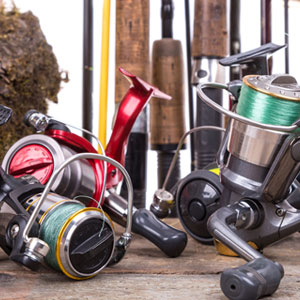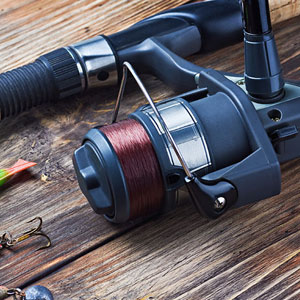Fishing Reel Maintenance and Care Tips
Increase the Life of Your Fishing Reels
Properly maintained reels should bring the user many years of trouble free service. *Be sure to read the New Reels section below regarding bearing lubrication of newly purchased reels.
I believe it's better to buy a new reel because you want one, rather than having to buy one due to poor performance from lack of maintenance. Besides, there's nothing worse than having a reel slip its gears, bind up, or have a drag lock down when you have a nice fish on the line. It's a sinking feeling that many of us have had, so I'm going to point out a couple things that will increase the useful life of your fishing reels:
- Any mechanical device needs attention of one sort or another. When it comes to fishing reel maintenance, the proper and least expensive form of upkeep is:
- Rinse with fresh water after use
- Periodically clean and lubricate your reel
- When it comes to fishing, fresh water is more forgiving than salt water. Fishing from a boat is more forgiving than wade fishing or possibly kayak fishing. Surf fishing is probably the least forgiving due to the amount of sand and salt spray that is blown around by the wind. Nonetheless, they all cause a need for attention to your reels. Service-wise, the only thing that changes from one type of fishing to the other is frequency.
- The easiest thing an angler can do to prolong the life of their equipment is to rinse everything with a fine spray of fresh water after use, allow the reel to dry, and then put a small dab of oil on all moving parts. I prefer silicone oil because it is very smooth and will not collect dirt.
- Avoid using any water pressure while rinsing, especially around the handles. Excess pressure can force water inside your reel through the bearing cups. I recommend you avoid rinsing under the spool of spinning reels. Water may enter through the pinion gear or under the rotor and flow down through the clutch/anti-reverse assembly, which sits directly on top of the main bearing. Water in that area will ruin both.
- Most of us have oldies but goodies lying around that we don't want to get rid of. It's wise to have it/them cleaned before storing for later use.
Salt Water Fishing Reel Maintenance
Salt water anglers need to be a little more prudent with upkeep. The reason is because of the higher concentration of minerals in salt water. When any water dries (either fresh water or salt water), it leaves behind mineral deposits that are abrasive. In some cases, when these deposits come in contact with certain metals, they can be corrosive. These mineral solids, when mixed with grease, will slowly wear away the internal parts of your reel.
The minerals in salt water will also absorb moisture causing additional problems. If ignored, these salts will destroy a reel through the heavy amount of abrasives grinding away at gears, bearings and bushings, etc. If deposited in the right place, the combination of minerals and moisture will badly corrode some parts and even eat holes through aluminum gears, spools, and reel bodies. When mineral deposits dry and harden in gear teeth, it not only wears out the gear but also puts uneven pressure on bearings which causes premature failure.
- If you fish only a few times per year, have your reel serviced a minimum of once per year.
- If you fish on a regular basis, your reel may need to be serviced more frequently.
Seasonal Fishing Reel Maintenance
For those who fish on a seasonal basis, it would be wise to have your reel serviced at the end of the fishing season rather than at the beginning of the following season. If moisture were to get inside your reel and you put it aside for four or five months, some reel parts may become damaged from corrosion. If you are going to have it serviced anyway, the proper time is at the end of the fishing season.
Important Note About Salt Water
If your reel gets dunked, it would be best to have it serviced as soon as possible, especially if it went into salt water. If it gets dunked in the surf, stop fishing and call it a day! Sand will be in everything and, if ignored, the parts needed to bring the reel back to normal working condition may cost more than the reel is worth.
- Using the right product is paramount for maintaining longevity. WD-40, 3-in-1 oil, furniture polish, and most other household cleaners, degreasers, polishes and lubricants have a specific purpose. They are not made for reel upkeep and should be avoided.
- Petroleum-based products may cause damage to certain plastics and rubber. Use products made for reel upkeep only — there are plenty of them to choose from.
*New Reels — Bearing Lubrication
I have an issue with new reel lubrication. This is something that has bugged me for a long time and it's also something most folks don't realize. This mainly pertains to open face or spinning reels because of the way they're built, but it's also necessary to realize this with ALL reels.
Many reels come out of the box with very little lubrication. That's one reason they spin so freely and feel so smooth when they're new. Take it out of the box, spin the handle, and it free wheels for 10 - 12 turns. Wow, that's great . . . for the salesman! It's bad for the consumer. The reason is because there is little to no grease in the bearings. All that is needed is a little condensation and your bearings start freezing up or the pinion gear starts wearing away. A properly lubed reel should have a little resistance when you turn the handle, due to the fact that there is grease in the bearings taking up the empty space.
Have you ever noticed that, after 3 or 4 outings, your reel feels lumpy, makes a whirling sound, or just doesn't feel like it did right out of the box? Or have you noticed that the first couple turns of the handle are stiff and you think, "Hmm, it wasn't like that last weekend . . ."? Then, the reel loosens up after a couple of turns, so you go on about your business. Or you take the spool off and notice the main shaft is black? Aside from poor lubrication the other problem is moisture: plain ol' condensation. Reels don't necessarily have to be dunked in water to get wet. They just need a little moisture to condense inside them. When small amounts of moisture condense inside your reel and then dry, it leaves behind the salts from the water. Those salts are abrasive: they mix within the grease and oil and start grinding away at bearings, bushings, gears, or anything that moves. When this starts happening, it's time to have your reel serviced. If ignored, oxidation WILL occur — seizing bearings, handles, knobs, pivot points, etc. Deposits will also form in the bottom of gear teeth. Under continued use, the excess pressure put on the gears will, in turn, put excess pressure on the bearings and bushings, causing premature failure.
Personally, I won't put a new reel in the water until it has been taken apart and properly lubricated. In years past, I've been through too many reels that turned into a piece of junk in short order because I believed that the manufacturer would do the right thing. The joke was on me!
The other issue with lubrication is that, too often a servicer will tell their customer not to over lubricate. In proper context that's correct, but too often they make it sound as though you'll destroy your reel if you lubricate it, so you tend to under lube it. In short, excess grease will make your reel a little stiff. Over-oiling will only cause the lubricant to leak out. My friend says he'd rather have oil drip out by over-oiling then have the bearings seize by under-oiling. I agree . . .
Trouble with Your Fishing Reels? We Can Help.
If you need more information on fishing reel maintenance and service, we can help! Email us or call us at today 813-728-5865




